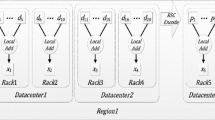Abstract
Disk is not only an important carrier to save data, but also a key component of storage system. It is of great significance to improve the reliability and data availability of disk. In the big data environment, the number of disks in the storage system is huge and distributed, so the maintenance for disk failure is inefficient and costly. Disk bad track is one of the most common disk faults. To solve this problem, this paper proposes a disk bad track isolation algorithm. This approach uses a data fault-tolerance mechanism to isolate physical bad tracks, effectively reducing the disk failure rate, improving service stability, and reducing system maintenance costs. The results show that the bad track isolation method can reduce the Disk IO exception by 47%, and significantly reduce the disk failure rate. It is effective in improving system stability and reducing maintenance cost.
Access this chapter
Tax calculation will be finalised at checkout
Purchases are for personal use only
Similar content being viewed by others
References
Liang, W., Ning, Z., Xie, S., Hu, Yu., Lu, S., Zhang, D.: Secure fusion approach for the internet of things in smart autonomous multi-robot systems. Inf. Sci.1–20 (2021). https://doi.org/10.1016/j.ins.2021.08.035
Liang, W., Zhang, D., Lei, X., Tang, M., Li, K., Zomaya, A.: Circuit copyright blockchain: blockchain-based homomorphic encryption for IP circuit protection. IEEE Trans. Emerg. Top. Comput. 1 (2020). https://doi.org/10.1109/TETC.2020.2993032
Liang, W., Xiao, L., Zhang, K., Tang, M., He, D., Li, K.C.: Data fusion approach for collaborative anomaly intrusion detection in blockchain-based systems. IEEE Internet Things J. 1 (2021). https://doi.org/10.1109/JIOT.2021.3053842
Liang, W., et al.: Deep neural network security collaborative filtering scheme for service recommendation in intelligent cyber-physical systems. IEEE Internet Things J. (2021). https://doi.org/10.1109/JIOT.2021.3086845
Hughes, G.F., Murray, J.F., Kreutz-Delgado, K., et al.: Improved disk-drive failure warnings. IEEE Trans. Reliab. 51(3), 350–357 (2002)
Li, J., Wang, G., Liu, X., Li, Z.: Overview of storage system reliability prediction. J. Front. Comput. Sci. Technol. 11(03), 341–354 (2017)
Xu, C.: Research and design of disaster data recovery system. Chongqing University of technology (2010)
Xie, Y., Dan, F., Fang, W., et al.: OME: an optimized modeling engine for disk failure prediction in heterogeneous datacentre. In: 2018 IEEE 36th International Conference on Computer Design (ICCD). IEEE Computer Society (2018)
Zhao, Y., Liu, X., Gan, S., Zheng, W.: Predicting disk failures with HMM- and HSMM-based approaches. In: Perner, P. (ed.) ICDM 2010. LNCS (LNAI), vol. 6171, pp. 390–404. Springer, Heidelberg (2010). https://doi.org/10.1007/978-3-642-14400-4_30
Zhu, B., Gang, W., Liu, X., et al.: Proactive drive failure prediction for large scale storage systems. In: Mass Storage Systems & Technologies. IEEE (2013)
Xiao, J., Xiong, Z., Wu, S., et al.: Disk failure prediction in data centers via online learning, pp. 1–10 (2018)
Li, J., Wang, G., Liu, X., Li, Z.: Review of reliability prediction for storage system. J. Front. Comput. Sci. Technol. 11(03), 341–354 (2017)
Jia, Y., Li, J., Jia, R., et al.: Hard disk failure prediction model validation in large data center environment. J. Comput. Res. Dev. 52(S2), 54–61 (2015)
Jiang, S., Du, C., Chen, H., Li, J., Wu, J.: An unsupervised adversarial learning method for hard disk fault prediction. J. Xidian Univ. 47(02), 118–125 (2020)
Tan, Y., Gu, X.: On predictability of system anomalies in real world. In: 2010 IEEE International Symposium on Modeling, Analysis and Simulation of Computer and Telecommunication Systems, pp. 133–140 (2010). https://doi.org/10.1109/MASCOTS.2010.22
Patterson, D.A., Gibson, G.A., Katz, R.H.: A case for redundant arrays of inexpensive disks (RAID). In: Proceedings of the International Conference on Management of Data (SIGMOD), 109–116. ACM, New York (1988)
Hamerly, G., Elkan, C.: Bayesian approaches to failure prediction for disk drives (2003)
Agarwal, V., Bhattacharyya, C., Niranjan, T., et al.: Discovering rules from disk events for predicting hard drive failures. In: International Conference on Machine Learning & Applications. IEEE Computer Society (2009)
Xiotech: ISE-The new foundation of data storage, 08 May 2008. http://www.xiotech.com/ise-technoloty.php
Lei, Z., Qiu, M., Tseng, W.C., et al.: Variable partitioning and scheduling for MPSoC with virtually shared scratch pad memory. J. Signal Process. Syst. 58(2), 247–265 (2010)
Guo, Y., Zhuge, Q., Hu, J., et al.: Optimal data allocation for scratch-pad memory on embedded multi-core systems. In: International Conference on Parallel Processing. IEEE (2011)
Vishwanath, K.V., Nagappan, N.: Characterizing cloud computing hardware reliability. In: Proceedings of the 1st ACM symposium on Cloud computing (SoCC 2010), pp. 193–204. Association for Computing Machinery, New York (2010)
Yang, H., Yang, Y., Tu, Y., Sun, G., Wu, Z.: Proactive fault tolerance based on “collection—prediction—migration—feedback” mechanism. J. Comput. Res. Dev. 57(02), 306–317 (2020)
Jia, R., Li, J., Wang, G., Li, Z., Liu, X.: Optimization and choice of hard disk fault prediction model based on AdaBoost and genetic algorithm. J. Comput. Res. Dev. 51(S1), 148–154 (2014)
Hu, W., Liu, G., Li, Q., Liu, X.: Research on intelligent failure prediction based self-healing storage system. J. Comput. Res. Dev. 48(S1), 7–11 (2011)
Qiu, M., Chen, Z., Liu, M.: Low-power low-latency data allocation for hybrid scratch-pad memory. IEEE Embed. Syst. Lett. 6(4), 69–72 (2014)
Murray, J.F., Hughers, G., Kreutz-Delgado, K.: Hard drive failure prediction using non-parametric statistical methods. In: Procof the ICANN/ICONIP, p. 1 (2003)
Murray, J.F., Hughes, G.F., et al.: Machine learning methods for predicting failures in hard drives: a multiple-instance application. J. Mach. Learn. Res. (2005)
Author information
Authors and Affiliations
Corresponding author
Editor information
Editors and Affiliations
Rights and permissions
Copyright information
© 2022 The Author(s), under exclusive license to Springer Nature Switzerland AG
About this paper
Cite this paper
Zhang, X., Zheng, L., Zhang, S. (2022). Research on Data Fault-Tolerance Method Based on Disk Bad Track Isolation. In: Qiu, M., Gai, K., Qiu, H. (eds) Smart Computing and Communication. SmartCom 2021. Lecture Notes in Computer Science, vol 13202. Springer, Cham. https://doi.org/10.1007/978-3-030-97774-0_18
Download citation
DOI: https://doi.org/10.1007/978-3-030-97774-0_18
Published:
Publisher Name: Springer, Cham
Print ISBN: 978-3-030-97773-3
Online ISBN: 978-3-030-97774-0
eBook Packages: Computer ScienceComputer Science (R0)




